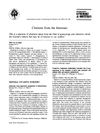 18 citations,
January 2013 in “Postepy Dermatologii I Alergologii”
18 citations,
January 2013 in “Postepy Dermatologii I Alergologii” Puberty often causes skin issues like acne and excessive sweating, and treatments require patience as results may vary.
 8 citations,
January 1996 in “Gynecological Endocrinology”
8 citations,
January 1996 in “Gynecological Endocrinology” Cyproterone acetate is the preferred treatment for women's hyperandrogenism when estrogen/progestogen use is safe.
 78 citations,
October 2020 in “Experimental Dermatology”
78 citations,
October 2020 in “Experimental Dermatology” Hidradenitis suppurativa is caused by genetic factors, inflammation, bacteria, hormones, and lifestyle factors like obesity and smoking.
[object Object]  3 citations,
June 1995 in “International Journal of Gynecology & Obstetrics”
3 citations,
June 1995 in “International Journal of Gynecology & Obstetrics” Laser laparoscopy effectively reduces pelvic pain in women with mild to moderate endometriosis and is safe to use.
January 2024 in “Medicina” Statins may help treat PCOS by lowering androgen levels and improving cholesterol.
 August 2021 in “Research Square (Research Square)”
August 2021 in “Research Square (Research Square)” Ferulic acid can reduce seizures and depression-like behaviors in catamenial epilepsy by balancing hormones and brain enzyme activity.
 65 citations,
January 2011 in “Frontiers in Endocrinology”
65 citations,
January 2011 in “Frontiers in Endocrinology” Neurosteroids show promise for treating epilepsy and more research is needed.
[object Object]  8 citations,
February 2003 in “Annals of Neurology”
8 citations,
February 2003 in “Annals of Neurology” Progesterone treatment improved seizures in a woman with menstrual cycle-related epilepsy, but a wrong medication worsened her condition.
 2 citations,
February 2003 in “Annals of Neurology”
2 citations,
February 2003 in “Annals of Neurology” Neuroimaging suggests that treatments targeting brain steroids could help control epilepsy, especially types linked to the menstrual cycle.
 76 citations,
December 2009 in “Clinics in Dermatology”
76 citations,
December 2009 in “Clinics in Dermatology” Hormonal treatments can help with acne but are not the first choice due to side effects and the need for careful patient selection.









